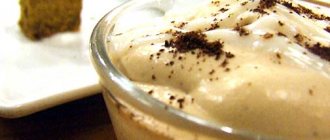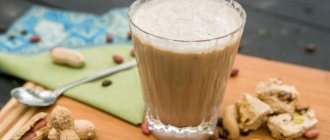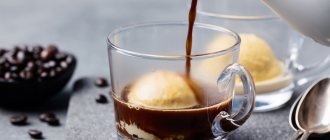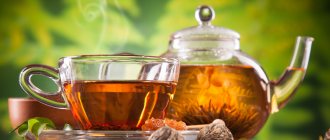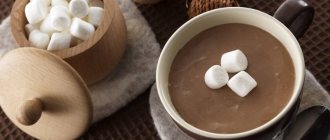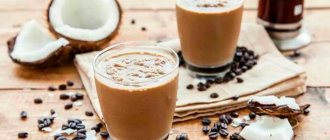Doctors and scientists have been arguing about the benefits and harms of coffee for decades. Regardless of the outcome of these discussions, the number of admirers of this tasty and aromatic drink is not decreasing. When consuming a product, people traditionally pay attention to its properties. Those watching their figure should also take into account the calorie content of coffee, which depends on many factors.
Coffee is a strong tonic drink.
Coffee calories
Calorie content of raw materials per 100 grams, depending on its type:
- granulated, instant coffee - 94 kcal;
- in grains - 223 kcal;
- ground - 201 kcal.
As you can see, the lowest calorie coffee is granulated. On average, take a heaped teaspoon for one cup (200 ml) - this is approximately 8 grams of raw material. It turns out that one cup of granulated instant coffee without milk, sugar, butter or condensed milk contains only 7.5 kcal. By the way, freeze-dried instant coffee has the same calorie content.
Photo source: shutterstock.com
Now let's calculate the energy value of one mug of a drink made from natural beans and ground coffee. To calculate, we again take 1 heaped teaspoon of raw materials per cup. These indicators are adhered to in most recipes for Turks, coffee machines, etc. Accordingly, we will need 8 grams of coffee. We carry out simple calculations and find out that:
- a cup of coffee beans - 17.84 kcal;
- a cup of ground coffee - 16.08 kcal.
However, the nutritional value of coffee in its pure form is low. Let's consider the average indicators of BJU (proteins / fats / carbohydrates) of raw materials per 100 grams:
- granulated, instant coffee - 15/3.5/0;
- in grains - 13.9/14.4/15.6;
- ground - 13.9/14.4/4.1.
As you can see, granulated coffee contains absolutely no carbohydrates, and the amount of protein and fat is low.
Which has more calories than tea or coffee? Extra calories from coffee and tea
The new National Health and Nutrition Examination Study, conducted in the United States by the National Center for Health Statistics, analyzed data collected from 2000 to 2012. According to these data, more than 13,000 adults preferred to drink coffee, and more than 6,200 preferred tea. This study found a hard truth: only 35% of coffee drinkers drink pure black coffee. This means the other 65% adds sugar, cream, flavored syrups, sweeteners such as sucralose and stevia, powdered cream and milk, and other forms of flavor enhancers. Ultimately, all those calories do tend to add up. For example, 30 ml of syrup (flavored with vanilla, hazelnut, mint, etc.) contains 100 calories and 25 grams of sugar. Considering that the average cup of flavored coffee contains between 15 and 60 ml of syrup, that's a ton of extra calories and sugar in your drink. Or consider creamer, one of the most popular non-dairy additives served with coffee in many restaurants. One packet contains 30 calories, two grams of fat and five grams of sugar. Add two or three packets, and you have a cup with extra calories and excess sugar. For a person who drinks only one cup of coffee a day, this excess may not be deposited. What about the 24% of people who drink more than 12 cups per week? This is at least two per day, which means twice as many calories. The average coffee drinker ends up consuming more than three cups per day. Since 60% of people say they need coffee to start the day, it's fair to assume that most of them will be getting more calories than they need to maintain a healthy weight. According to research, more than 60% of the extra calories in coffee come from sugar, not milk or cream. Tea lovers have the same problems. Adding sugar or other sweeteners, cream or milk can significantly increase the calorie content of the drink. “Tea with additives increases daily caloric intake by an average of more than 43 calories compared to “empty” tea. And almost 85% of them come from sugar,” says Rupeng An, a professor of kinesiology and public health at the University of Illinois who conducted the study. Remember this the next time you go to a cafe or approach the coffee maker. Think about all those extra calories you'll get. And what they can do to your arteries, digestive and immune systems, and your waistline. Perhaps then you can add less sugar or milk or reduce the amount of coffee. Because these calories will be reflected in both centimeters and kilograms.
Calorie content of coffee with sugar
The calorie content of a teaspoon of sugar is 25 kcal. If you add 2 or 3 teaspoons to coffee, the calorie content of the drink will increase by 50 or 75 kcal, respectively. Most often, a couple of teaspoons of sugar are added to a cup of coffee (200 ml).
Photo source: shutterstock.com
Thus, the final calorie content will be as follows:
- granulated, instant coffee - 57.5 kcal;
- in grains - 67.84 kcal;
- ground - 56.08 kcal.
But the nutritional value of sweet coffee will change more compared to bitter coffee without sugar. So, proteins, fats and carbohydrates are equal to 1.29/0.66/9.29 g, respectively.
Calorie table for the most popular coffee drinks
To make it more convenient to immediately find the calorie content of the drink you are interested in, you need to use the table:
| Drink name | Number of kcal in one serving |
| Natural coffe | 1-2 |
| Americano | 15 |
| Latte | 250 |
| Cappuccino | 150 |
| Mochaccino | 290 |
| Frappuccino | 400 |
| Glasse | 125 |
| Latte Macchiato | 60 |
| Instant coffee | 14 |
So, coffee is a delicious drink that itself contains very few calories, which is why it is allowed on almost all diets. The calorie content of coffee increases rapidly if you add milk, cream, sugar, condensed milk or chocolate syrup to it. To make it easier to monitor the amount of calories in your diet received along with coffee, it is convenient to use the table and the calorie values of coffee additives.
How many calories are in 1 cup of coffee:
♦ Category: Healthy products.
Read for Health one hundred percent:
- How many calories are in tomato juice from different manufacturers?
- The benefits and harms of white chocolate: history, composition and calorie content
- It’s interesting to understand the benefits of chicory
- Dietary educational program: how many calories are in fish
- Tea with lemon balm - enjoying life and health benefits
- No need for migraine pills?
- Products containing proteins, fats, carbohydrates: tables, descriptions, features
- How to eat healthy and healthy with chronic pancreatitis
Coffee with milk: calorie content
Milk is the most popular additive to coffee. It has less calories than sugar, but it is still worth considering. Moreover, it should be remembered that the numbers vary significantly depending on the fat content of the milk. For example, in 20 ml of milk with a fat content of 1.5% there will be 9 kcal, and with a fat content of 3.2% - 12 kcal.
Photo source: shutterstock.com
Calorie content of coffee with milk with 1.5% fat:
- granulated, instant coffee - 16.5 kcal;
- in grains - 26.84 kcal;
- ground - 25.08 kcal.
Calorie content of coffee with milk 3.2% fat:
- granulated, instant coffee - 19.5 kcal;
- in grains - 29.84 kcal;
- ground - 28.08 kcal.
At the same time, the average nutritional value of coffee with milk without sugar is represented by the following indicators: 1.77 g of proteins, 1.39 g of fats and 2.66 g of carbohydrates.
ABC RECOMMENDS
How many calories are in coffee with milk without sugar?
Instant coffee: calorie content
We have already noted above that the calorie content of instant coffee (raw material) per 100 g is on average 94 kcal. However, calorie intake can vary significantly depending on the brand of coffee. For example, Nescafe contains only 88 kcal, Jacobs - 101 kcal, and Japanese Moccona - 109 kcal per 100 grams!
Photo source: shutterstock.com
Based on average indicators, the content of proteins, fats and carbohydrates in a similar volume is 9.57/2.29/9.59 g, respectively.
Coffee latte: calories
There is no single standard for a coffee cocktail - it is made in different ways, in cups from 120 to 480 ml. The calorie content of a latte directly depends on the volume and type of milk used (cow's, almond, soy, coconut or oat milk), as well as on additives (sweeteners, syrups, fillers). However, the average nutritional value of a latte per 100 grams is about 105 kcal, and BJU is 5.02/5.43/9.22 grams, respectively.
Photo source: shutterstock.com
Let's look at the calorie content of latte depending on the brand:
| Name | Volume, ml | Kcal |
| CoffeeHouse, classic | 250 | 111 |
| CoffeeHouse, low fat | 250 | 73 |
| Shokoladnitsa, light | 320 | 125 |
| Chocolate girl | 400 | 220 |
| Coffee mania | 330 | 156 |
| Starbucks, caramel | 480 | 250 |
| Starbucks, with nuts | 480 | 190 |
| McDonald's | 360 | 140 |
| McDonald's | 480 | 210 |
An interesting variety of latte is flat white coffee. Traditionally it is prepared in a thick-walled porcelain cup. Its distinctive feature is voluminous snow-white foam.
Calorie content of latte and what it depends on
The calorie content of a drink is not a constant value and depends on the quality and quantity of ingredients, as well as the presence of sugar in coffee. Adding various syrups to latte increases the energy value.
The calorie content of a classic latte in a medium-sized glass is 150-180 kcal, excluding sweet additives.
Type of milk
The choice of dairy product is very important when making coffee. Sweetness and taste are determined by the presence of lactose. Content less than 4% – tasteless, unsweetened latte coffee.
Stable and strong foam depends on the protein level, and its elasticity depends on the fat content.
Ideal for coffee:
- amount of protein – 3% and above,
- fat – 3.2-4%.
Preferably pasteurized milk with natural fat content is used.
Taking into account the above indicators, a dairy product of both animal and plant origin is chosen.
Kinds:
- Animal – whole, pasteurized;
- Vegetable - almond, soy, oatmeal (easier to whip into foam, ideal for latte).
Sweeteners
Many people don't like coffee because of its bitter taste. This problem can be easily solved by increasing the calorie content of the drink, all kinds of sweeteners:
Sugar
- White is the most common and highest in calories;
- Brown – sweeter than usual, but preferable for people on a diet;
- Raw sugar is unprocessed, the sweetness is lighter, and the calorie content is lower than that of white sugar.
Reference! Consumers interested in weight loss often use artificial sweeteners. There is active debate about how beneficial sweeteners are. This does not hinder their popularity and widespread use.
Honey
Be sure to read: American coffee: grain selection, grinding, technology
Natural, nutritious - a storehouse of vitamins and the best alternative to sugar, despite its high calorie content.
Stevia
Natural sweetener of plant origin. The main advantage is the minimum number of calories.
Syrups
There are a great many variations of this latte product:
- Natural maple – contains antioxidants, fights cancer cells, good for patients with diabetes. Contains a low amount of calories.
- Berry, fruit, vanilla, caramel, chocolate, coconut and others - the list can take a long time.
Portion volume
Latte coffee is served in transparent tall glasses. Only a translucent vessel allows you to get aesthetic pleasure from a three-layer drink.
Latte is served in three sizes:
- 300 ml Irish latte glass;
- 250 – average;
- and a very small version of 150 ml.
Coffee with cream: calories
Many people cannot imagine their morning without coffee with cream. However, 100 ml of cream with 20% fat content contains approximately 205 kcal! 10 ml is usually added to a cup of coffee, increasing the calorie content of coffee by 20.5 kcal.
Photo source: shutterstock.com
Thus, the calorie content of coffee with cream (20%) without sugar is:
- granulated, instant coffee - 28 kcal;
- in grains - 38.34 kcal;
- ground custard - 36.58 kcal.
The average indicators of BJU per 100 grams of coffee with cream are presented as 1.91/5.91/9.94 grams, respectively.
Composition of the drink and the ratio of proteins, fats and carbohydrates
Traditionally, according to the Italian recipe, cappuccino is prepared from a third of strong espresso, the same amount of milk and airy milk foam. The finished drink is decorated with cocoa powder or grated chocolate with cinnamon.
Each cup of coffee according to the Italian recipe consists of a certain amount of:
- proteins;
- fats;
- carbohydrates.
100 ml contains 1.8 g of protein, about 4 g of fat (affects the fat content of the dairy product), 14 g of carbohydrates (depending on the additives used, the amount of sugar). Sugar-free coffee typically contains no more than 3.9 grams of carbohydrates. As for calories, they can be calculated by clearly understanding how many ingredients were used and with what percentage of fat content.
Cappuccino coffee: calories
Cappuccino is a delicious drink containing espresso, sugar and cream. Naturally, its calorie content is extremely high. One 150 ml serving contains 201 kcal.
Photo source: shutterstock.com
Let's look at the calorie content of cappuccino depending on the brand:
| Name | Volume, ml | Kcal |
| CoffeeHouse, classic | 250 | 102 |
| CoffeeHouse, low fat | 250 | 68 |
| Burger King | 300 | 144 |
| Starbucks, cappuccino grande | 480 | 140 |
| McDonald's | 200 | 75 |
| McDonald's | 300 | 125 |
Italian coffee from McDonald's - how many calories?
Connoisseurs of the menu of an American fast food restaurant will find it useful to know the calorie content of cappuccino at McDonald's, which is affected by the volume of the drink. Customers are offered coffee in 0.3 and 0.2 liter glasses. In the first case, cappuccino without sugar has 125 kcal, in the second - 75 kcal.
When calculating the energy value of Italian coffee with milk and airy foam, you should think about replacing sugar with natural honey, candied fruits, and dark chocolate in small quantities. In this combination, the drink will not harm your figure and will bring no less pleasure.
You might be interested in The best instant coffee according to the Test Purchase
Americano coffee: calorie content
Many people prefer to treat themselves to Americano coffee. And it’s not surprising, because it is extremely aromatic, but not too strong. Essentially, the drink project is espresso and water. It does not contain sugar or cream, and therefore the calorie content of the drink is not high at all.
Photo source: shutterstock.com
Let's look at the caloric content of Americano depending on the brand:
| Name | Volume, ml | Kcal |
| CoffeeHouse, classic | 250 | 91 |
| CoffeeHouse, low fat | 250 | 62 |
| Coffee mania | 330 | 131 |
| Chocolate girl | 400 | 190 |
| McDonald's | 360 | 105 |
| McDonald's | 480 | 168 |
Composition and nutritional value of coffee
The nutritional value of the drink is represented by the unique chemical composition of coffee beans, which includes the following beneficial substances:
- alkaloids (trigonelline and caffeine);
- vitamins P, B2, B3 and B5;
- tannins (tannins);
- essential oils;
- mineral salts and trace elements (potassium, phosphorus, calcium, iron, manganese, nitrogen, etc.);
- acids (chlorogenic, quinic, citric, caffeic, oxalic, etc.).
It is also worth considering the fact that during roasting the proportions of elements contained in the grain change and new compounds are formed (for example, vitamins PP). Depending on the type of coffee beans and the degree of roasting, the composition of the drink also differs.
Composition of nutrients, BJU
Milk – 1 cup (244.8g)
| For quantity: 1 cup | ||
| Calories — 122 | Calories from fat - 41 | |
| BJU | ||
| Total fat content | 4.58g | |
| Saturated | 2.77g | |
| Polyunsaturated | 0.34g | |
| Monounsaturated | 1.13g | |
| Cholesterol | 14.69 mg | |
| Total carbohydrate content | 12.34g | |
| Dietary fiber | 0g | |
| Sugar | 12.29g | |
| Squirrels | 8.13g | |
| Vitamins and microelements | ||
| A - 94.88 µg | C - 1.52 mg | |
| B-6 – 0.1 mg | B-12 - 0.93mcg | |
| D - 1.88 µg | E - 0.1 mg | |
| Calcium 301.1 µg | Iron 0.15 mg | |
| Magnesium 28.2 mg | Zinc 1.03mg | |
| Potassium 386.78 mg | Sodium 146.88 mg | |
Distribution of calories for BJU:Carbohydrates (41%) Fats (33%) Proteins (26%) | ||
Daily coffee consumption
The daily intake of caffeine for adult women and men is 400 mg, which roughly corresponds to 3 glasses of an invigorating drink. With this volume, no adverse reactions from the central nervous and cardiovascular systems are observed.
Photo source: shutterstock.com
Scientists (children under 16 years of age and pregnant women) caffeine intake should not exceed 300 mg per day, and ideally no more than 200 mg. However, according to the results of statistical studies, modern people consume significantly more caffeine than recommended, and in most cases there are no side effects. But it is still worth remembering that excessive coffee consumption puts a high burden on the kidneys and heart.
ABC RECOMMENDS
How many cups of coffee a day prolongs life?
The benefits and harms of coffee
Why do doctors sometimes recommend including coffee in your diet, while some are asked to refrain from drinking the aromatic drink? The benefits of coffee for the body are invaluable and consist of the following properties:
- increased performance;
- relief from muscle pain after exercise;
- increase in the number of liver enzymes;
- reducing the risk of Alzheimer's disease, type 2 diabetes, gout and cancer;
- protection against free radicals that destroy healthy cells and accelerate the aging process;
- improving gallbladder function and reducing the risk of gallstone formation;
- antibacterial effect, which helps reduce the risk of caries and other dental diseases.
All of the above properties are more characteristic of boiled black coffee, without sweeteners and cream. Green coffee is also considered beneficial.
Photo source: shutterstock.com
But the popular drink can bring more than just benefits. Sometimes it can cause harm if there are contraindications. The harm of coffee to human health is manifested in the following properties:
- disruption of the stomach and pancreas (especially if you drink coffee on an empty stomach);
- difficulty in the work of platelets, which help stop bleeding by clogging the damaged vessel;
- increased blood pressure;
- increased risk of osteoporosis and insomnia (if you drink coffee at night);
- increased anxiety and stress.
Coffee can be especially harmful to women's health, as it can provoke mastopathy. With this disease, lumps form in the mammary glands, which increase in size and hurt during menstruation. All of the above negative properties of the drink manifest themselves mainly when it is consumed on an empty stomach or when the daily norm is exceeded. Don't forget about this if you like to treat yourself to black coffee, latte or espresso.
ABC RECOMMENDS
Not so harmful: 7 myths about caffeine that are still believed
Calorie content of tea. Dietary properties:
What is the calorie content of tea, what dietary properties does it have? All this is very interesting for those who are trying to lead a healthy lifestyle, monitor their health and figure. So we will try to answer these questions in the next article.
So here it is:
All scientists and doctors say: regular consumption of properly brewed tea is good for health. The composition of tea leaves includes almost all vitamins, as well as caffeine, tannin, and various essential oils. Unfermented and low-fermented tea is especially useful.
With proper daily consumption of this drink, the nervous system is activated and thought processes are improved. It helps increase the level of hemoglobin in the blood and has a beneficial effect on the functioning of the spleen and liver. It is useful to drink for patients with hypertension and atherosclerosis. Tea without sugar prevents the development of caries and is indispensable for poisoning. Compresses made from it quickly cure sunburn. In addition, it is able to regulate body temperature, so during the hot season it is recommended to drink green tea instead of water.
The tea drink is a potent remedy, so it should be consumed in moderation. High doses of caffeine can trigger the development of certain diseases.
30–50% of tea consists of extractive – water-soluble – substances. But in practice, these substances never completely dissolve. Green tea has more soluble substances - 40-50%, and black tea has much less - 30-40%. Also, the level of extractives depends on its quality. The older and coarser the leaves, the worse the substances dissolve in the infusion.
All soluble substances can be divided into six main groups. These are alkaloids, amino acids, tannins, pigments, essential oils and vitamins.
The main vitamin of tea is vitamin P. Together with vitamin C, it enhances the effectiveness of ascorbic acid and promotes its absorption in the body. In addition, many components of tea can act like vitamin P. It strengthens the walls of blood vessels and prevents internal hemorrhages. In the plant world, this drink ranks first in terms of vitamin P content. White and green tea have the greatest P-vitamin activity. A person who drinks 3–4 cups of tea a day provides the body with the required daily dose of vitamin P.
Another important vitamin for the body contained in tea is vitamin K. It promotes the liver's production of prothrombin, which is necessary to maintain normal blood clotting.
Calorie table
To know exactly what kind of coffee you can drink on a diet, and which one is better to abstain from, you need to carefully read the calorie table of the presented drinks.
| Type of coffee | Kcal per 100 ml |
| Instant coffee without additives | 3,75 |
| Bean coffee without additives | 8,92 |
| Coffee from ground beans without additives | 8,04 |
| Latte | 44 |
| Americano | 36,4 |
| Mocha (with chocolate) | 112 |
| Cappuccino | 41 |
| Macchiato | 100 |
| Mochaccino | 135 |
| Coffee three in one | 52 |
| Rough coffee | 84 |
| Glyase | 125 |
The final properties of coffee, including its benefits or harm, depend on the method and correctness of preparation. You can see how delicious it is to brew coffee beans at home without a special coffee machine in the video:
Calorie content of main types of coffee
The calorie count of coffee varieties depends on the preparation techniques and composition:
| Type of drink | Calorie content of a standard serving (kcal) |
| Latte | 180-200 |
| Cappuccino | 120 |
| Mocaccino | 250-289 |
| Glyase | 100-200 |
| Mocha | 330 |
| Frappuccino | 400-420 |
| In Irish | 114 |
| Raf | 85 |
| Frappe | 400-450 |
| A la Pompadour | 200 |
| Espresso | 4-7 |
